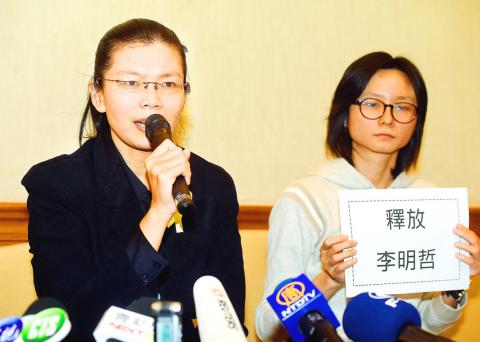Detained human rights advocate Lee Ming-che’s (李明哲) wife is to forgo the right to legal counsel and fly to Beijing in search of her husband, Lee Ching-yu (李淨瑜) said yesterday.
“Our government will put in the effort they will put in, but as a family member I cannot do nothing,” Lee Ching-yu told a news conference in Taipei. “I have to take action because every second and minute is torment for my husband.”
She said her decision had been made earlier the same day, adding that she had yet to inform the Straits Exchange Foundation.

Photo: Fang Pin-chao, Taipei Times
A former Democratic Progressive Party (DPP) staffer who works at Wenshan Community College in Taipei, Lee Ming-che went missing last week after entering Guangzhou on what his wife has said was a visit to share Taiwan’s experience of democratization with Chinese.
Beijing confirmed on Wednesday that he has been detained because of his “involvement in activities that threaten China’s national security.”
While family members and lawyers have a right to visit the detained under the Cross-Strait Joint Crime-Fighting and Judicial Mutual Assistance Agreement (海峽兩岸共同打擊犯罪及司法互助協議), China suspended its implementation of the agreement when President Tsai Ing-wen (蔡英文) took office last year.
The Chinese government has yet to announce what charges are to be brought against Lee Ming-che, Lee Ching-yu said, adding that she has decided against hiring a lawyer.
“Any legal defense is useless because China’s laws are not based on universal values,” she said, adding that she would focus on humanitarian concerns and human rights.
“I will not acknowledge any admission of guilt or other statement from my husband until I see him face to face, because it could be something forced from him by threats,” she said.
Beijing was chosen as her destination because Chinese authorities have yet to announce where Lee Ming-che is being held, she said, adding she would travel there “within the next few days.”

A year-long renovation of Taipei’s Bangka Park (艋舺公園) began yesterday, as city workers fenced off the site and cleared out belongings left by homeless residents who had been living there. Despite protests from displaced residents, a city official defended the government’s relocation efforts, saying transitional housing has been offered. The renovation of the park in Taipei’s Wanhua District (萬華), near Longshan Temple (龍山寺), began at 9am yesterday, as about 20 homeless people packed their belongings and left after being asked to move by city personnel. Among them was a 90-year-old woman surnamed Wang (王), who last week said that she had no plans

TO BE APPEALED: The environment ministry said coal reduction goals had to be reached within two months, which was against the principle of legitimate expectation The Taipei High Administrative Court on Thursday ruled in favor of the Taichung Environmental Protection Bureau in its administrative litigation against the Ministry of Environment for the rescission of a NT$18 million fine (US$609,570) imposed by the bureau on the Taichung Power Plant in 2019 for alleged excess coal power generation. The bureau in November 2019 revised what it said was a “slip of the pen” in the text of the operating permit granted to the plant — which is run by Taiwan Power Co (Taipower) — in October 2017. The permit originally read: “reduce coal use by 40 percent from Jan.

China might accelerate its strategic actions toward Taiwan, the South China Sea and across the first island chain, after the US officially entered a military conflict with Iran, as Beijing would perceive Washington as incapable of fighting a two-front war, a military expert said yesterday. The US’ ongoing conflict with Iran is not merely an act of retaliation or a “delaying tactic,” but a strategic military campaign aimed at dismantling Tehran’s nuclear capabilities and reshaping the regional order in the Middle East, said National Defense University distinguished adjunct lecturer Holmes Liao (廖宏祥), former McDonnell Douglas Aerospace representative in Taiwan. If

‘SPEY’ REACTION: Beijing said its Eastern Theater Command ‘organized troops to monitor and guard the entire process’ of a Taiwan Strait transit China sent 74 warplanes toward Taiwan between late Thursday and early yesterday, 61 of which crossed the median line in the Taiwan Strait. It was not clear why so many planes were scrambled, said the Ministry of National Defense, which tabulated the flights. The aircraft were sent in two separate tranches, the ministry said. The Ministry of Foreign Affairs on Thursday “confirmed and welcomed” a transit by the British Royal Navy’s HMS Spey, a River-class offshore patrol vessel, through the Taiwan Strait a day earlier. The ship’s transit “once again [reaffirmed the Strait’s] status as international waters,” the foreign ministry said. “Such transits by